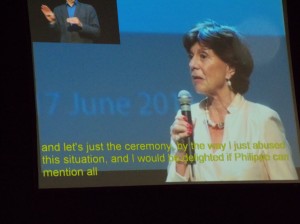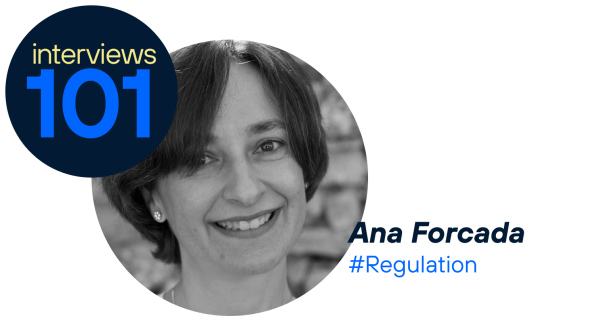As announced in our Blog, the first Digital Agenda Assembly took place at the nice Autoworld Centre in Brussels on 16-17 June. We were more than 1300 participants, and apparently 800 could not attend!
It was amusing to discuss and debate actions towards new technologies for a better future in Europe surrounded by old car and antique aircrafts…A nice and amazing constrast, I would say.
Commissioner Kroes opened the event giving a “State of the Digital Union” speech, announcing that by 2015 “50% of European Citizens and 80% of businesses should be using online public services”. This is a challenging objective!
She talked of the transformative power of the Internet and the potential for ICT to help grow the EU’s economic force. She considers that ICT is “an essential engine for our economies” and she stressed the need for investment in high-speed networks, of course, but most of her speech was for trust to be fostered online, putting a strong accent on safer online access for children, the main focus of the EC Safer Internet Programme.
 More specifically, she mentioned the need to implement a single click reporting system to denounce harmful content for children in Internet. (By the way, Telefónica has already implemented this useful tool in Spain, a single button to report harmful contents for kids, and it is working very well!)
More specifically, she mentioned the need to implement a single click reporting system to denounce harmful content for children in Internet. (By the way, Telefónica has already implemented this useful tool in Spain, a single button to report harmful contents for kids, and it is working very well!)
Finally, she also mentioned the need for Europe to set up a strong plan for cybersecurity, even sharing experiences with other countries, such as the USA. So we assume that the EC will also work hard on this issue in the next months.
Her closing call was to invite every attendee to actively contribute to the workshops and main Conference.
This event was really taking advantage of the different digital tools available nowadays. The Assembly organisers actively sought out input from the European public, asking for feedback via Twitter and to send in videos about their thoughts and opinions on the Digital Agenda priorities. The Commission also created Communities of Interest, examining five specific Digital Agenda projects. However, the debates were so intensive so sometimes the remote contributions (mainly via Twitter) were not that visible. Something to improve for next Digital Agenda Assembly!
In the 24 parallel workshops run over two days, stakeholders had the opportunity to discuss specific topics in more depth. In the workshops, topics ranging from demographic change to green ICT were addressed, with the results of the workshops translated into a very interesting interactive map, linking Digital Agenda priorities but also the current status and future recommended actions.
I personally attended Workshop 5 on “Financing and facilitating Broadband projects” and the main conclusions were that there are still challenges both in the demand and supply side. There is a clear problem from the supply side of a sustainable business model under the current regulatory and market conditions and there is a plethora of examples all around Europe showing that a one size does not fit all. From the demand side, the main effort should be focused on increasing this demand and showing the benefits of high speed broadband. There were some interesting debates but solutions will not be easy to find!
You can have an overview of this workshop via this video.
[youtube]http://www.youtube.com/watch?v=KLukuutdNXw[/youtube]
I also attended Workshop 23 on “Digital Agenda for Europe: building an open and global market place”, where several contributions were made from different regions with their own perspective: Europe of course, but also from USA, Africa, Latin America, Japan, China, etc… highlighting initiatives from several industry players.
The main outcomes on this workshop were that now everything has become global so there is a need to find new mechanisms to establish a real and efficient global dialogue as most of the issues touching this market (data protection, cybersecurity, cloud computing…) and the challenges they present are nowadays affecting all the geographical regions without exception. There is a real need to work together and to assure a certain level of coordination to take advantage of the potential benefits of the digital world.
You can access to the agenda of this workshop here and also a brief summary via this video.
[youtube]http://www.youtube.com/watch?v=PwOPMyJeQSY[/youtube]
Now the European Commission is gathering the information shared during those two days to analyse it. You can even contribute now if you were not part of this event, here.
The EC will take future measures to try to assure that Europe will reach the objectives assigned for 2015 but this will be quite challenging! From Telefónica’s side, we are already fully involved in main of the Digital Agenda pillars, as you could have noticed through several posts in these last weeks!
Do you think that the European Commission is covering the main issues through the Digital Agenda to reach its objectives for 2015? What other topics would you include to make the main objectives become a reality? Do you think that the Digital Agenda Assembly will guide efficiently the EC and its future work?












